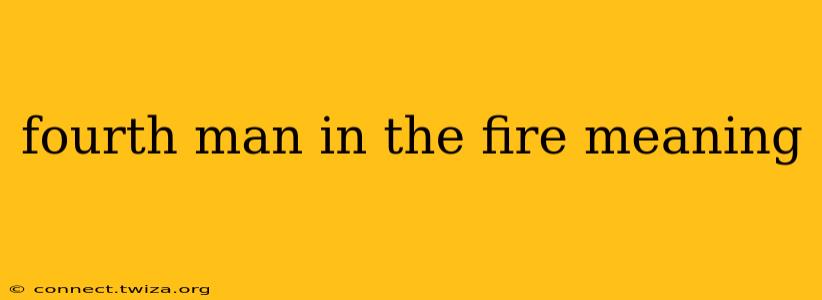The phrase "fourth man in the fire" originates from the Book of Daniel in the Bible (Daniel 3:25), where three Hebrew men—Shadrach, Meshach, and Abednego—are miraculously saved from a fiery furnace by a "fourth man" whose appearance is like the Son of God. This seemingly simple narrative holds profound and multifaceted meanings that have resonated through centuries of religious and secular interpretation. Understanding its meaning requires exploring several key aspects.
What Does "Fourth Man in the Fire" Symbolize?
The fourth man isn't simply a deus ex machina; he represents a powerful symbol with several interpretations:
-
Divine Protection and Intervention: The most common interpretation is that the fourth man symbolizes God's direct intervention, a miraculous rescue from certain death. This highlights God's power, mercy, and unwavering protection of those faithful to Him. The unharmed state of the three Hebrews, despite the intense heat, demonstrates divine power overcoming earthly threats.
-
Presence of the Divine Amidst Suffering: Beyond just rescue, the fourth man's presence symbolizes God's closeness and comfort during times of trial and tribulation. He is not just a rescuer at the end but a companion in the midst of suffering. This offers solace and hope, suggesting that even in the face of seemingly insurmountable challenges, God is present.
-
The Power of Faith and Obedience: The story itself is a testament to faith and unwavering obedience to God. The three Hebrews refused to bow down to a false idol, even in the face of death. The fourth man's appearance can be seen as a reward for their steadfast faith and loyalty.
-
Transformation and Resurrection: Some interpret the fiery furnace as a symbol of purification or trial. The fourth man's presence signifies a transformative experience, emerging from the fire refined and strengthened. This can be linked to themes of resurrection and rebirth, highlighting the possibility of spiritual renewal amidst adversity.
What Does the Fourth Man Look Like?
The biblical text describes the fourth man as having "the appearance of a son of God." This description is intentionally vague, allowing for varied interpretations across different religious traditions. It signifies a being of divine nature, possessing power and glory exceeding human understanding. The lack of specific physical description encourages personal reflection and connection with the divine.
Why Is This Story Still Relevant Today?
The story of the fourth man in the fire continues to resonate with people today because it addresses universal human experiences:
-
Facing Immense Challenges: The story speaks to the struggles we all face in life—moments when we feel overwhelmed, threatened, and on the brink of despair.
-
Finding Strength in Faith: It offers a powerful message of hope and resilience, suggesting that faith can provide strength and comfort even in the most challenging circumstances.
-
Experiencing Divine Presence: It underscores the possibility of divine intervention and support, fostering a sense of hope and reassurance in the face of uncertainty.
-
The Importance of Moral Integrity: The story stands as a testament to the importance of upholding one's moral beliefs, even when faced with pressure or persecution.
Frequently Asked Questions:
What is the significance of the number four?
The number four holds symbolic weight in many cultures and religions. In this context, it could represent completeness, universality, or the four elements (earth, air, fire, water). However, the primary focus remains on the presence of a divine being offering protection and hope.
What other interpretations exist for the fourth man?
Various theological and spiritual interpretations exist. Some view the fourth man as an angelic being, while others see it as a pre-incarnate Christ. The ambiguity of the text allows for diverse interpretations, making it a rich subject for ongoing discussion and reflection.
The story of the fourth man in the fire isn't just a historical narrative; it's a timeless parable offering hope, strength, and a powerful reminder of the potential for divine intervention in our lives. Its enduring relevance lies in its ability to speak to our deepest fears and aspirations, providing comfort and guidance in times of trial.
